- Home
- Jim Kjelgaard
Two Dogs and a Horse
Two Dogs and a Horse Read online
Two Dogs and a Horse
by Jim Kjelgaard
First published in 1963
This edition published by Reading Essentials
Victoria, BC Canada with branch offices in the Czech Republic and Germany
[email protected]
All rights reserved. No part of this book may be reproduced or transmitted in any form or by any means, electronic or mechanical, including photocopying, recording, or by any information storage or retrieval system, except in the case of excerpts by a reviewer, who may quote brief passages in a review.
Two Dogs and a Horse
by
Jim Kjelgaard
Two Dogs and a Horse
A Dog Remembers
This is the story of a friendly, amiable dog who became a victim of man’s hasty judgment. Although compelled to live as the wild live, he clung to the memory of a gentle old man. A judgment of death was passed upon him, and the crack of a rifle and a red-hot bullet burning his ribs were his farewell salutes from all he had known. But he never forgot the comradeship of a human voice and the touch of a human hand, and from this came a fidelity greater than his heritage from the wild, fierce packs with which his ancestors had once hunted.
The dog came out of the hills one morning with old Jed Fentress and walked beside him into the town of Stauffer. Jed carried a shepherd’s crook, although, so far as anyone knew, he had never owned a sheep. His white hair, falling about his shoulders, and his flowing white beard, seemed made for a red suit and Christmas carols. He was a kindly old man, but it was said in Stauffer that he was not quite right in the head. Even though he lived far back in the hills where wild animals abounded, his only weapon was the shepherd’s crook. His home was a cabin at the head of a creek known as Roaring Branch. During the summer, he ranged the hills, hunting ginseng, golden seal, and other medicinal plants for which there was a market, and if he were in the right mood, he could be hired for an occasional odd job. But he would go nowhere unless his dog was also welcome.
His taste in dogs was startling! He never owned a small one, possibly he thought big dogs better fitted the big hills he loved so well. He understood and loved his dogs, and, in turn, was adored by them, and perhaps that was a sort of compensation. He did not understand his fellow men nor did they understand him.
The dog that walked into the village with him was huge. The predominant strain was shepherd, but it had a dash of another breed, probably wolfhound, that had given it added size and weight. Still young, it retained all a puppy’s eager friendliness and some puppy clumsiness. Its tail never seemed to stop wagging.
The first person who saw the pair was Arnold Peterson, a stonemason, who was laying a foundation for a new house on the outskirts of town. Peterson shouted in mock fear, “My gosh, Jed, chain that lion before it kills somebody!”
A few nearby people who had heard Peterson shout were delighted to carry on where he left off—towns the size of Stauffer never have much exciting entertainment. Word spread that Jed Fentress, the gentle old root hunter from the hills, was coming into town with a lion. As man and dog passed down the street, there was more simulated fear of the dog. A few boys worked themselves into a mild hysteria. Whenever any child came near, the “lion” wagged its tail or licked the small face. He was so big that he did not have to rear in order to perform this ceremony.
Jed made a few purchases at the store, packed them into a gunny sack, which he slung over his shoulder, and started back to the hills. Until he was out of sight, good-natured warnings to beware of the lion followed him.
As soon as possible, Jed veered from the highway. He never walked on roads when he could find a trail. Some of the trails he liked were so dim, so well-hidden, they seldom knew any feet besides his and those of wild beasts. He took such a trail today, and sighed happily when he was again in shaded woods.
He understood the hills, and all about them. He read furtive rustlings in the brush as understandingly as residents of Stauffer read their newspapers. He knew the winter’s den from which the she-bear, waking lean from her winter’s hibernation, took her cubs to meet their world. He could interpret the cries of the hawk, the screams of the jay. The pitch and tone of the wind, the sound of the rain, the formation of the clouds, the actions of birds, all told him secrets hidden from most men.
The touch of the puppy’s nose against his hand was something else he understood. The puppy, bubbling with young, curious life, wanted to explore the mountainside. Jed waved his hand.
“All right, Brad. Go ahead and run.”
After the gangling young animal had bounded away, the trail pitched up sharply through a laurel and rhododendron thicket. Jed used his shepherd’s crook to help him over some rough spots. He was not tired, or even perspiring, because his life had been given to this sort of walking and he was conditioned to it. The trail neared a long-unused tote road, originally built by loggers and still traveled occasionally by people who knew the country’s short cuts. Jed hesitated, anxious to preserve his solitude. If some chance wayfarer was on the trail, he would wait and let him go by. But the road was empty. He broke out of the laurel and swung along.
Presently, his keen ears caught a sound that did not fit in, and he stopped to determine what it was. There were a few large trees along both sides of the road, but, for the most part, the forest was a scattering of aspens and brush. Some animal was making a labored way through the brush on the right.
A young deer came in sight, walking slowly and with great effort. Its legs seemed wooden things, moving to the timed turning of a gear. As soon as it crossed the road, it fell, no longer able to walk or even to rise.
Obviously, it had been chased for a very long way by some other animal. Jed gripped his shepherd’s crook and faced the direction from which the deer had come.
A gray dog, heavier and older than the puppy that had trotted at Jed’s side, came out from the brush. Its eyes were a blaze of fury. A rippling snarl rose in its throat. It snarled again, crouched, and began to stalk the man that stood between it and the exhausted deer.
Jed swung the shepherd’s crook and the wild dog dodged. The man swung again—and desperation laid a despairing hand upon him. Beads of perspiration gleamed on a forehead that had seldom known the sensation. The wild dog sprang and the shepherd’s crook swung—swung once more and once more missed.
Two days later, Arnold Peterson, the mason, coming up the lonely road to see if the first yellow lady-slippers were yet in bloom, found the old man. It was obvious to Peterson that Jed had been attacked by a vicious dog, and the mason remembered the dog that had come into Stauffer with the root hunter. Hadn’t it been as big as a lion? Hadn’t everyone said it looked like a lion, and warned Jed to be careful? What had started as a joke had become grim reality. Beyond a doubt, Jed had been killed by his own dog. Everybody had always said that, some day, one of the monsters he was forever owning would kill him.
Brad had come to Jed’s cabin at the head of Roaring Branch while he was still a weanling puppy. From the time he was able to waddle about, he had known no caresses or attentions save those bestowed by the old man of the hills. He worshipped Jed Fentress, and because he did, he wanted nothing more than to please him.
Told he was free to run, after he and Jed had visited Stauffer and caused such a sensation, Brad roamed widely. This section of the hills was familiar to him. However, even if it had been strange country, he would have used a good dog’s sense of orientation. Usually, he knew where to find Jed. When he lost him, he simply put his nose to the ground and trailed.
Brad loafed into the spring woods, investigating the many intriguing scents. A doe bounded away and he raced happily after her, never suspecting that he had been deliberately led away from a c
oncealed fawn.
He descended the hill, drank from a spring a cold water that bubbled from beneath a rock, and lay down in the water and let it cover his back. Cooled off, he emerged from the spring and shook himself. A raccoon, faring into this secluded nook by day, was prowling along the rill that flowed away from the spring. Brad pricked his ears, wagged his tail, and approached this interesting stranger. The raccoon ruffled his fur, growled, and dashed forward. Brad yelped and streaked away. He was merely exploring. If there were hostile creatures in this part of the woods, he wanted none of them.
At last, thinking to meet Jed at the cabin, he traveled to where Roaring Branch leaped over rocks and sparkled down riffles on its way to the distant river. He came to the sapling fence that kept deer out of the garden and his ears dropped in disappointment. He knew the old man should have arrived before this, and was disconsolate because he was not there. Brad liked to ramble, but it was comforting to come back to Jed when rambling palled. He drank again and started down the trail by which Jed usually arrived from the tote road.
He came out on the road and, at once, a mighty uneasiness crept over him. The bristles on his neck lifted and he growled. Careful, stiff-legged, he moved forward. Cautiously, he approached old Jed, lying on the ground, and touched him with a gentle nose and lay down beside him. Something, he did not know what, was very wrong.
His nostrils filled with another scent. His hackles rose again and he lifted snarling lips. This other scent was that of the wild dog.
Brad pointed his muzzle at the sky and a sad howl broke from him. He had been surrounded with man’s veneer of civilization, but, abruptly, this veneer was broken. He scented violence and, all in a moment, was a wild dog, answering the call of a fierce ancestry, yet unable to forget what still bound him to today. He remained near the body of his dead master, circling around it and off into the woods on either side. His nose gave him the story of what had taken place more clearly than any human eye could have read the tale. The ground where the buck had fallen retained the message of a frightened animal. While old Jed had vainly battled the wild dog, the buck had gained strength to go on. The obstacle that had stood between himself and his intended victim removed, the wild dog had taken up its interrupted hunt.
Brad knew that the wild dog was bigger and heavier than he. Uneasy apprehension trembled through him, but loyalty kept him near that which he loved.
When Arnold Peterson appeared on the road, Brad faded into a hideout of nearby rhododendrons. Why he hid he did not know; he had never before hidden from man. He crouched, flat on the earth, his black nose resting on his extended paws in involuntary obedience to a law he did not understand. Old Jed had been his world. Now that his world had suddenly ended, there was no safety or security and he had been thrown back upon ancient instincts. He watched Arnold Peterson cover old Jed with his jacket. As soon as Peterson left, the dog came out of hiding and smelled around the jacket.
An hour later, he hid again. A half dozen men, accompanied by a small black and white dog, were coming up the road with picks, shovels and rifles. The men dug in the earth and the black and white dog rested in the shade of a tree.
Nothing about the men or the dog escaped Brad. He saw the dog arise in the shade and study the shielding rhododendrons. One of the men stopped digging and looked straight at the hideout. A tremor ran through Brad and the centuries gave him counsel. The actions of the dog and the man told him that his presence was suspected. Suddenly, he was away, streaking through the brush.
Behind him arose a great shouting.
“There he goes!”
“There’s the dog that killed Jed!”
“Git him! Git him!”
A rifle cracked and then there was a second shot. Two bullets lanced into the earth beside Brad, and a third clipped a twig above his head. Then something hot and sharp slashed his side. He veered, instinctively putting as much brush as possible between him and the danger. Two more shots exploded.
Brad ran far, stopping finally in an isolated tangle of laurel. For a while he lay with his body plastered flat along the ground. By and by, he sat up and licked the bullet groove along his ribs.
That night, he left his hiding place and slunk down to a lonely creek to drink. His first instincts and impulses, his first responses to wild law, had been the correct ones. They had guided him safely. Yet, the law that now controlled him could not have full control. Never could he be entirely a wild thing, for he had once known and understood the gentleness of old Jed.
Slowly, always making sure of what lay ahead, Brad went back to the tote road. He threw himself on Jed’s grave and wailed his grief at the uncaring stars, while hate of the wild dog mingled with his woe. When he left, a new light burned in his eyes. He knew what must be done, and, in spirit, he was no longer a puppy.
At a strong lope, he struck down a path that led into the back reaches of the hills. The scent of the wild dog lay sharp in his memory. He would recognize that scent if his nose found it again. But with the memory of the wild dog’s scent lay apprehension—the wild dog was powerful and fierce.
Living on rabbits, varying that diet with an occasional woodchuck or muskrat, Brad lay in the thickets all day and came back to the tote road at night. He saw men—and hid from them so successfully that they did not glimpse him again. He did not know that the first aroused determination of the villagers to hunt him down and kill him had begun to die soon after it was born. Neither could he know that, not having seen him since he had fled from old Jed’s grave, the villagers had begun to think that a shot had found its mark and that he had died in some lonely place. All Brad knew was that, at length, fewer men came to the hills. Gradually, he began to range more by day.
Six weeks after old Jed’s death, Brad came face to face with the gray dog. Dozens of little streams purled through the hills, and he was drinking from one of them when he looked up sharply and saw his enemy across a six-foot rill. The animal snarled and cleared the stream in a single leap.
Brad whirled away. Terror loaned him its speed and he drew ahead. The gray, though big and strong, did not have his prey’s young fleetness. Brad raced up two hardwood rises before he discovered that he was no longer pursued.
* * *
Spring’s green melted into summer’s golden-green and, in turn, gave way to autumn’s riot of color. The first frost sparkled on the earth and the leaves began to fall. During their mad month, the grouse flew crazily and the north wind’s cold bite was a promise of snow and bitter things to come.
And still Brad, a gentle dog gone wild, continued to range the hills. Experience made him an expert hunter. He knew where the big-footed snowshoe hares gnawed their brush-bordered runs, and where to conceal himself beside the runs so he could make a kill when he pounced. He found the clearings where cottontails shucked their cloak of caution and came to dance when the moon was full. He knew the deer runs, although he seldom bothered to hunt deer. Small game was too abundant and too easy to get.
No longer was he an awkward, loose-skinned pup, with paws too big for his body. He had grown strong and full, and his legs were hard and muscular. His fangs were polished needle points and his jaws were iron-muscled. His eyes were no more the eyes of one man’s dog or any man’s dog. He had become a wild animal.
But the passage of time did not take the scent of the wild dog from Brad’s nostrils. Whenever that scent became strong, he bristled, even in his sleep.
Three times since their first meeting he had met the gray terror. Once the apparition had rushed unexpectedly out of the forest, and again he had saved himself by flight. Twice he had been hunting cottontails in a clearing when the gray dog had appeared. Neither time had there been another desperate race. The gray had learned that Brad could outrun him.
Around the fringes of the wild law lay loyalties the law was unable to overcome. Brad did not recognize them as loyalties, but they often brought him to the leaf-covered mound on the tote road and the cabin at the head of Roaring Branch. The cabin’s do
or had never been locked, and in these months of neglect it had fallen in. Grass grew high in the once neat yard. The garden fence was broken down by raiding deer that had devoured the vegetables there. Brad never slept in the cabin. He had developed a deep-seated distrust of all enclosed places.
Then one night, a howling gale came out of the north. The day had been sunny, almost warm, but at twilight the temperature started a sudden drop that carried it well below the zero mark. In a laurel thicket, where he had sought a refuge from the storm, Brad became restless.
The ancient law of the wild grew weak and thin. He had lived with man and within man’s shelter, and gnawing loneliness crept over him. He felt a desperate need for companionship and rose, blinking into the stinging wind and whining softly in his throat. He could not continue to travel alone, and there was only one place to which he could go.
He journeyed through the darkness, unmindful of the snarling wind. He had been living as a wild thing lives, and the wild had provided for him. He was lean, steel-muscled. His coat was thick and heavy, an adequate shield against inclement weather. He crossed ice-locked Roaring Branch and approached the cabin.
Suddenly, he tensed. The wind from the cabin had brought him a hated scent. For a moment he stood quietly, but when he moved again, he went forward. As he had known it would, the gray came out of the cabin to meet him.
They met, two furies almost evenly matched in strength and weight. The gray struck as savagely as a wolf, and his fangs cut a gaping wound on Brad’s neck. But as Brad’s body had grown, so had his heart and courage. Paws scraped on frozen earth as the gray whimpered and parried.
It was the gray who finally broke and ran. Brad overtook him beside the cabin old Jed Fentress had built. It was very dark in the shadow of the cabin’s wall.
Brad alone walked away from the cabin. He went directly to the tote road and old Jed’s grave, as though he found it necessary to stop and report. When he left in the dawn, he did not look back.

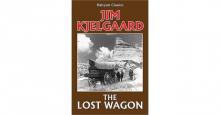 The Lost Wagon
The Lost Wagon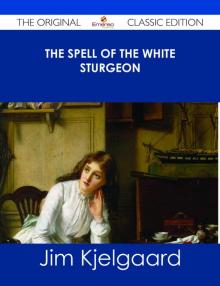 The Spell of the White Sturgeon
The Spell of the White Sturgeon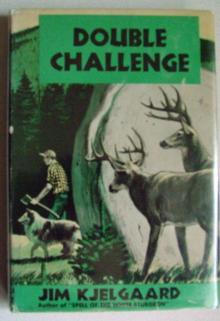 Double Challenge
Double Challenge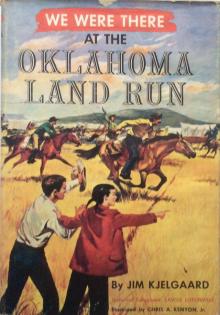 We Were There at the Oklahoma Land Run
We Were There at the Oklahoma Land Run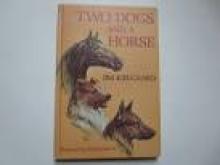 Two Dogs and a Horse
Two Dogs and a Horse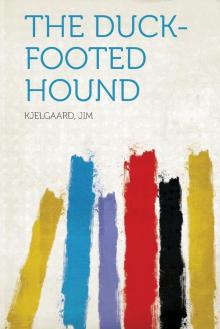 The Duck-footed Hound
The Duck-footed Hound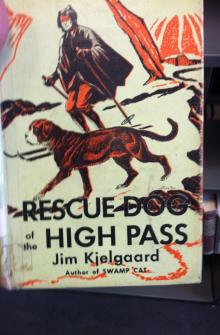 Rescue Dog of the High Pass
Rescue Dog of the High Pass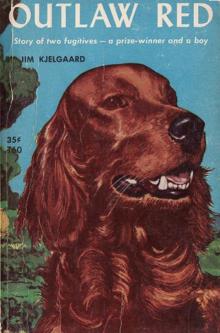 Outlaw Red
Outlaw Red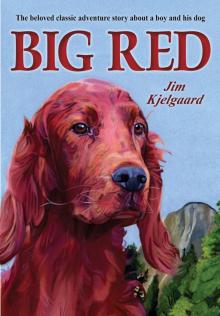 Big Red
Big Red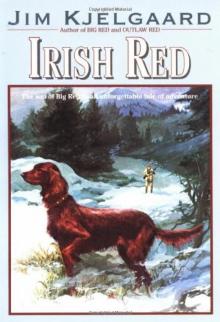 Irish Red
Irish Red